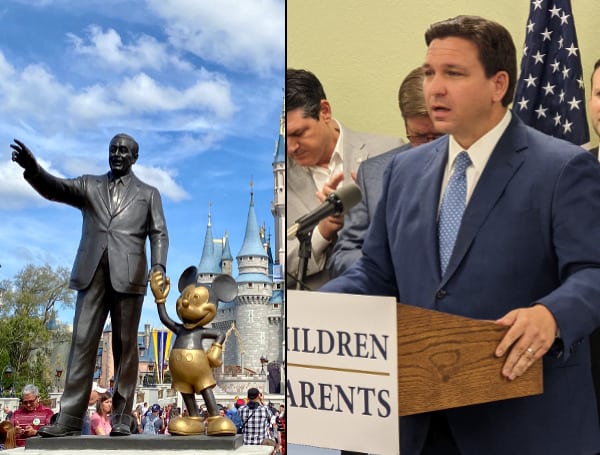Florida Governor Ron DeSantis presented an update Thursday regarding the Central Florida Tourism Oversight District (CFTOD) and emphasized certain disconcerting discoveries from the inaugural independent, comprehensive audit of the former Reedy Creek Improvement District, which spanned a period of 55 years.
Furthermore, DeSantis lauded the enhancements that the CFTOD had implemented for the benefit of district residents, taxpayers, and visitors.
“I worked with the Florida Legislature to bring accountability to a corporate-run government that sacrificed the people’s interests to the interests of a single corporation,” said Governor Ron DeSantis. “The District’s recent audit report justified our shared concerns: Disney was acting as a law unto itself. Since our reforms, the new district has taken bold action to increase transparency, community engagement, and fiscal responsibility, and has saved taxpayers $18.4 million.”
Read: Florida Gov. DeSantis, Rep. Byron Donalds On Shortlist Of Trump VP Picks
“Under the former Reedy Creek District, locally owned, veteran-owned and small businesses were largely shut out and subservient to the Disney scheme, and thanks to the Governor’s leadership the old deal is done,” said Florida Secretary of Commerce J. Alex Kelly. “The new oversight has not only saved Florida taxpayers money—but is creating competition, local and small business opportunities, and seeding opportunities for job seekers and the future entrepreneurial and talent pipelines in Central Florida.”
In 2023, Governor DeSantis signed House Bill 9-B, which required the District’s Board of Supervisors to “submit to the Governor, the President of the Senate, and the Speaker of the House of Representatives, within one year after the effective date … a report that includes a review of all remaining powers and authorities.”
This report covered past practices of the former Reedy Creek Improvement District Board of Supervisors, the former District Administrator, and District employees.
Some of what the audit found included the following:
- Disney exercised near-total governing authority over the special district. Among other exceptional privileges, Disney gave itself the right to create and run its own fire and police departments—and even build and oversee its own nuclear power plant.
- Disney hired consultants that advised the company to “limit the score of democracy” so Disney would have the “freedom from impediments to changes, such as… elected political officials.”
- Reedy Creek’s land use and planning decisions were not subject to “veto points” or “choke points,” which are purposeful institutional restraints in our constitutional system.
- Disney created a Corporate Kingdom where employees and board members were treated to lavish spending and gifts. Some of those benefits included:
- Millions of dollars of annual passes for entry to Disney theme parks worldwide.
- 40-percent discounts on Disney cruises.
- Free transferable single-use tickets during the holiday season.
- Steep discounts on Disney merchandise.
- Steep discounts on food and beverages in the Disney theme parks and resorts.
- Access to non-public shopping reserved for Disney cast members, where merchandise was steeply discounted, and items were made available that were otherwise not available for public purchase.
- Disney created a self-serving system where the District would use taxpayer dollars to purchase benefits, and those taxpayer dollars were funneled back to Disney by the District.
- The former Reedy Creek administrator incurred nearly a quarter of a million dollars on his Reedy Creek American Express card for expenses ranging from retirement parties, holiday and city resident parties, tickets for athletic events, and food and beverages.
- Reedy Creek’s contracting process was a self-serving system for Disney, wherein vendor sourcing benefited the corporation instead of the taxpayer.
- Taxpayers have saved $4.6 million with the new competitive contracting system focused on local vendors providing the best services at the lowest price.
Read: Florida Senate Passes Environmental Funding Plan
The outgoing Reedy Creek board, desperate to secure Disney’s hold on power after Florida acted, instituted several 11th-hour agreements with Disney that purportedly would have lasted decades and—in at least one instance—up to 100 years.
The CFTOD also implement much needed, and in some cases never-before-performed, safety inspections in the District through the Florida Department of Transportation (FDOT).
Along with inspecting bridges and roadways throughout the state, FDOT oversees and inspects “fixed guideway” transit systems. Examples of “fixed guideway” transit systems include the Jacksonville Skyway, the Miami Metro Mover, the Tampa Streetcar, and the Monorail at Disney World. Until 2023, all but one of those four systems were subject to regulatory oversight—Disney’s Monorail. Records reviewed to-date by FDOT have yet to provide evidence that Disney had ever conducted any inspection on the underwater portions of the Monorail, including the portion spanning Bay Lake.
Since being granted inspection authority by the Florida Legislature, FDOT is providing the necessary oversight of the Monorail at Disney World with a continuing initial inspection of the Monorail’s 14 miles of above- and below-water concrete piers and beams, which support the system’s structural integrity. Moving forward, FDOT will ensure that this system, which had no oversight for half a century, is safe for Florida residents and visitors.
With 68 million visitors coming to the District annually and nearly 100,000 employees, it is right that the Central Florida region sees the full benefit from tourism-related developments. To realize these benefits, the District is prioritizing locally owned businesses with the newly established BUY LOCAL NOW procurement program, which has already resulted in $9.6 million in local contracts and $1.5 million in taxpayer savings.
CFTOD is significantly improving the District for its tenants, taxpayers, and visitors. These improvements include critical safety inspections, the newly established open and competitive bid process for contract services (as government-contracted work should be), and a commitment to reducing the overall tax burden on those who live and do business in the District, with $18.4 million saved to date.
Help support the Tampa Free Press by making any small donation by clicking here.
Android Users, Click To Download The Tampa Free Press App And Never Miss A Story. Follow Us On Facebook and Twitter. Sign up for our free newsletter.



